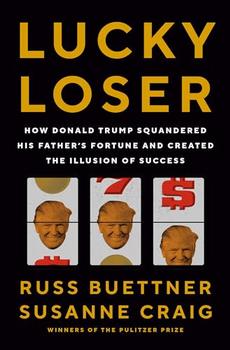
How Donald Trump Squandered His Father's Fortune and Created the Illusion of Success
by Russ Buettner, Susanne Craig
From the Pulitzer Prize-winning reporters behind the 2018 bombshell New York Times exposé of then-President Trump's finances, an explosive investigation into the history of Donald Trump's wealth, revealing how one of the country's biggest business failures lied his way into the White House.
Soon after announcing his first campaign for the US presidency, Donald J. Trump told a national television audience that life "has not been easy for me. It has not been easy for me." Building on a narrative he had been telling for decades, he spun a hardscrabble fable of how he parlayed a small loan from his father into a multi-billion-dollar business and real estate empire. This feat, he argued, made him singularly qualified to lead the country. Except: None of it was true. Born to a rich father who made him the beneficiary of his own highly lucrative investments, Trump received the equivalent of more than $500 million today via means that required no business expertise whatsoever.
Drawing on over twenty years' worth of Trump's confidential tax information, including the tax returns he tried to conceal, alongside business records and interviews with Trump insiders, New York Times investigative reporters Russ Buettner and Susanne Craig track Trump's financial rise and fall, and rise and fall again. For decades, he squanders his fortunes on money losing businesses, only to be saved yet again by financial serendipity. He tacks his name above the door of every building, while taking out huge loans he'll never repay. He obsesses over appearances, while ignoring threats to the bottom line and mounting costly lawsuits against city officials. He tarnishes the value of his name by allowing anyone with a big enough check to use it, and cheats the television producer who not only rescues him from bankruptcy but casts him as a business savant – the public image that will carry him to the White House.
A masterpiece of narrative reporting, Lucky Loser is a meticulous examination spanning nearly a century, filled with scoops from Trump Tower, Mar-a-Lago, Atlantic City, and the set of The Apprentice. At a moment when Trump's tether to success and power is more precarious than ever, here for the first time is the definitive true accounting of Trump and his money – what he had, what he lost, and what he has left – and the final word on the myth of Trump, the self-made billionaire.
Media reviews not yet available.
This information about Lucky Loser was first featured
in "The BookBrowse Review" - BookBrowse's membership magazine, and in our weekly "Publishing This Week" newsletter. Publication information is for the USA, and (unless stated otherwise) represents the first print edition. The reviews are necessarily limited to those that were available to us ahead of publication. If you are the publisher or author and feel that they do not properly reflect the range of media opinion now available, send us a message with the mainstream reviews that you would like to see added.
Any "Author Information" displayed below reflects the author's biography at the time this particular book was published.
Russ Buettner and Susanne Craig are investigative reporters at the New York Times. Since 2016, their reporting has focused on the personal finances of Donald J. Trump, including in-depth articles that revealed the fortune Trump inherited from his father and the record of business failures hidden in twenty years of Trump's tax returns. Their articles on Trump's inheritance were awarded a Pulitzer Prize in 2019. Buettner joined the Times as an investigative reporter in 2006. He was a finalist for a Pulitzer Prize in 2012. He previously worked on investigations teams at the Daily News in New York and New York Newsday. Craig previously covered Wall Street and served as Albany bureau chief for the Times. Prior to joining the Times in 2010, Craig was a reporter at The Wall Street Journal and The Globe and Mail, Canada's national newspaper.
Your guide toexceptional books
BookBrowse seeks out and recommends the best in contemporary fiction and nonfiction—books that not only engage and entertain but also deepen our understanding of ourselves and the world around us.